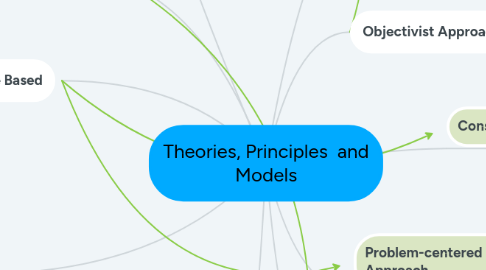Theories, Principles and Models
by Teresa Theiling


1. Cognitive Load Theory
1.1. Focus on Meaningful Learning
1.2. Need to consider the cognitive processing of a learner to achieve meaningful learning
1.3. Strategies to reduce cognitive load
1.3.1. Present words as narration
1.3.2. Allow time between segments presentation
1.3.3. Eliminating extraneous Material
2. Community of Inquiry and Collaboration
2.1. Learning increases as student's socially interact with one another
2.2. Communities of practice is the foundation for social learning
2.2.1. Joint Enterprise: Accountability
2.2.2. Mutuality
2.2.3. Shared resources
3. Motivation
3.1. ARCS model
3.1.1. Attention
3.1.2. Relevance
3.1.3. Confidence
3.1.4. Satisfaction
3.2. Student learning
3.2.1. Instructional events
4. Cognitivism
4.1. Thinking
4.2. Problem solving
4.3. Language
4.4. Concept formation
4.5. Information processing
4.6. Concerned with what learner's know and how they acquire it
4.6.1. Encourage the learner to use appropriate learning strateiges
5. Experience Based
6. Constructivism
6.1. Creating meaning (or learning) from experience
6.1.1. Activity (practice), Concept (knowledge), and Culture (context)
6.2. Action is based on the interpretation of the experience
6.3. Flexible use of pre-existing knowledge
7. Behaviorism
7.1. Proper response is demonstrated when learning occurs
7.2. The Stimlus, the response and the relation between the two
7.3. Large emphasis on environmental factors
7.4. Strategies: instructional cues, reinforcement and practice.
7.5. Examples
7.5.1. Skinner's teaching machines
7.5.2. Computer Assisted Instruction (CAI)

